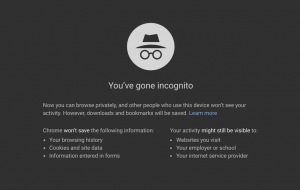According to the latest Digital 2021 report, the average internet user spends almost 7 hours per day online, either on a mobile device or on a desktop — equating to roughly 42% of their waking lives. It’s not really a surprise though; we use the web for work, shopping, entertainment, education, and social media. In fact, more than 60% of the world’s population is online.
With so much of our time spent in front of our screens, browsers have become goldmines of data. Companies can, and do, use that valuable information to provide you with a customized and convenient user experience on their sites and platforms. It’s also used to power the internet’s business model — targeted advertising, which is when advertisers use your browsing data to follow you around the internet and serve you ads they think are relevant to you. However, if that data falls into the wrong hands, it can be exploited by malicious actors
“60% of the world’s population is online, SO IS THEIR DATA.”
If you’re concerned about your online activities and information being collected, stored, sold, or exploited, it’s time to get smart about your browsing habits. The first step towards smart browsing is understanding your vulnerabilities. The second step is knowing what to do about it, namely, switching to a private browser.


How to Test Your Browser Privacy: Use the Free Tool on Safer.com
Your browser knows more about you than the average internet user realizes. It knows not only your browsing history and cookies, but your physical address, your Internet Service Provider (ISP), your Domain Name System (DNS) server, your internet speed, the plug-ins and fonts you’ve installed, hardware details, and even seemingly innocuous information like your screen resolution and color depth.
To call attention to how this data can be used to track your online activities, the team behind Avast built a free browser privacy test tool to help you determine what data your browser leaves behind (known as a Digital Footprint) as you navigate the internet.
Available on Safer.com, this comprehensive web app tests your browser for several privacy threats, providing easy-to-understand explanations and solutions to help you safeguard your digital identity.
“The first step towards smart browsing is understanding your vulnerabilities.”
Enhance Your Web Security
If the first step toward protecting your online privacy and security is knowing how large your digital footprint is and how much of it is exposed by your browser, then the next step is knowing what to do about it — using the best private and secure browser that fits your needs. There’s no shortage of browsers available, so make sure to pick one that you trust to keep your browsing data secure. The most convenient private browsers will have security and privacy tools built right in, so you won’t have to research and install additional extensions and tools.
There are a number of secure browsers you can use outside there.











